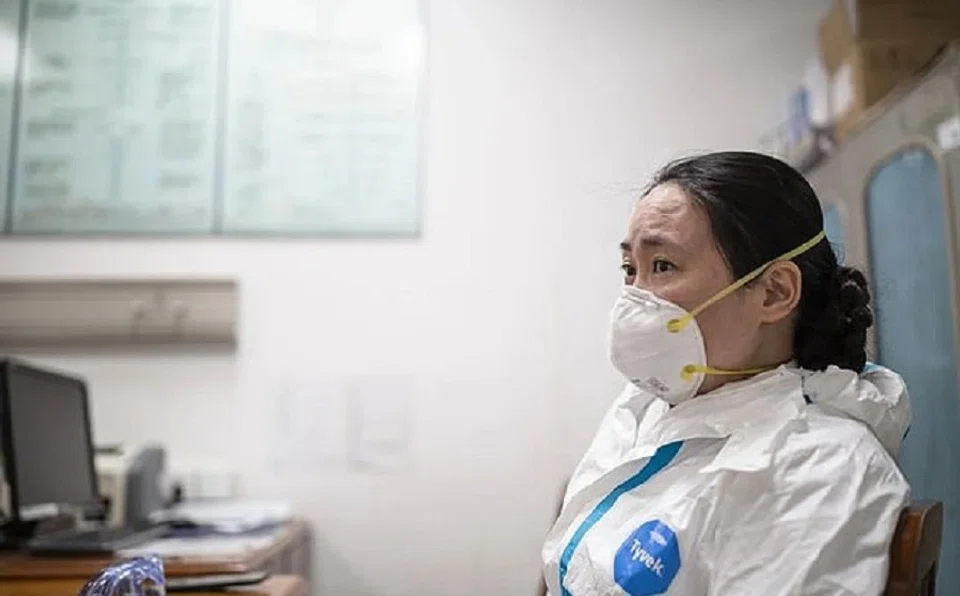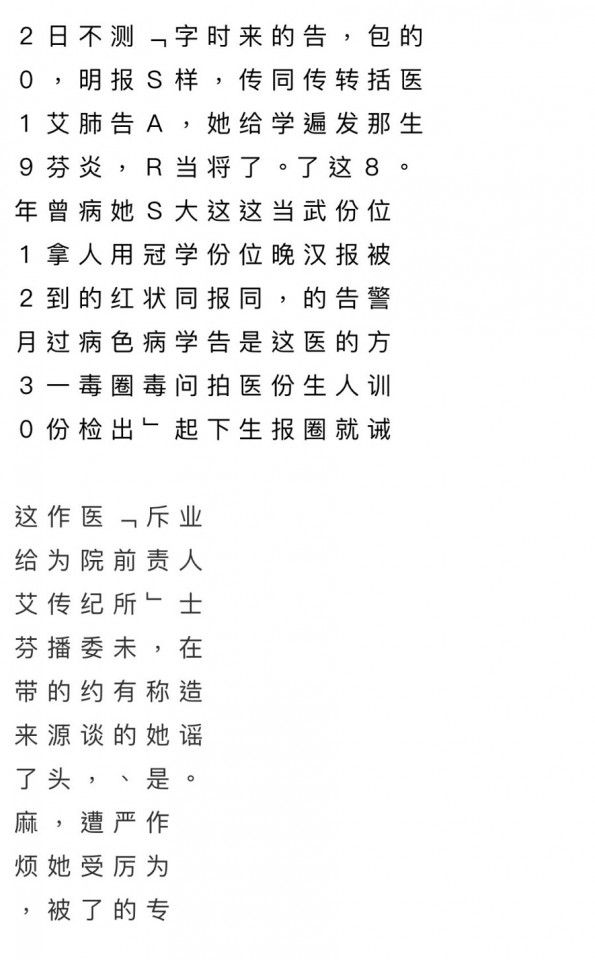[Photo story] How to keep an article alive on the Chinese internet? Netizens show off creativity
Texts written in reverse, replaced with emojis, and encrypted in morse code... Netizens demonstrated their creativity in resurrecting an interview with Ai Fen, director of The Central Hospital of Wuhan's emergency department, after it was removed by the authorities from the internet in China. ThinkChina traces how Chinese citizens banded together to keep an article alive, and shares a story of the "404 Building" written by a netizen.

China's Renwu (人物) magazine recently published an interview with Ai Fen, director of The Central Hospital of Wuhan's emergency department.
This article was removed from China's internet, prompting Chinese netizens to recreate the article and share it in various formats including screenshots, PDF documents, and even garbled text and morse code.
The subject of Renwu's latest cover story was Ai Fen, a doctor from Wuhan. According to the interview, Ai Fen had received a patient's test report of an unknown pneumonia on 30 December 2019, where she had circled the words "SARS coronavirus" in red. When asked about the unfolding situation by her university classmate, she took a screenshot of the report and sent it to her classmate who is also a doctor. That night, this report went viral among doctors in Wuhan, and Li Wenliang, an ophthalmologist who later died of the coronavirus himself, was among the eight doctors who had shared the report and were punished by Wuhan police.
Four doctors have passed away as a result of the coronavirus at The Central Hospital of Wuhan where Ai Fen works, and over 200 over medical staff are infected.
Ai Fen did not describe herself as a whistleblower, but rather as the one "who provided the whistle". She later received a warning from the Wuhan Municipal Health Commission via her hospital, asking her to stop spreading rumours that would trigger public fear and anxiety or she would be punished. She was even summoned by the hospital's disciplinary inspection committee and faced an "unprecedented, extremely harsh reprimand".

"If I knew things would turn out this way, I couldn't care less if they [hospital officials] reprimanded me. I would have told whoever and wherever I wanted!" - Ai Fen
Four doctors have passed away as a result of the coronavirus at The Central Hospital of Wuhan where Ai Fen works and over 200 over medical staff are infected. She revealed that the high price that the hospital paid was due to the lack of transparency in information. Of the people infected, doctors in the emergency and respiratory departments were mostly mildly infected as they realised that something was amiss and knew how to protect themselves. They rested when needed and promptly sought treatment when they were unwell. Critically-ill doctors were mostly from the peripheral departments, like late Dr Li Wenliang who was an ophthalmologist, and late Dr Jiang Xueqing who took care of patients with thyroid and breast diseases.
Ai Fen believes that if everyone was alerted from the beginning, the situation would not have been so tragic. She was deeply regretful that she did not continue to yell about the virus: "If I knew things would turn out this way, I couldn't care less if they [hospital officials] reprimanded me. I would have told whoever and wherever I wanted!"
Ai Fen also mentioned in the interview that she hoped for an apology from the hospital, but dared not request for it. Thus far, no one has apologised to her. In fact, police did not drop charges against Dr Li Wenliang for "spreading rumours" right until his death, even though he was considered one of the earliest whistleblowers of the outbreak.
After the interview was published on 10 March, it was quickly deleted, as were reposts on the different websites and social media platforms that the article was shared on. This led to angry Chinese netizens going into "creation mode", reproducing the article in different forms and sharing them on the internet and various social media platforms.
Among the different versions were screenshots, PDFs, text in reverse, text in hanyu pinyin, text replaced with emojis, and so on. The article was also translated into different languages, including English, Vietnamese, French, Hebrew, braille, and others. However, some of these versions still failed to escape internet inspection and were quickly deleted again.
The following screenshots are from a WeChat account that consolidated the ways that creative netizens went on a relay race to keep the interview available on the internet.
Having the text vertically typed or typed in reverse are common tactics used to escape deletion:


However, these elementary methods were quickly detected and the posts were deleted from the internet once more. Exasperated, netizens used other ways to preserve the article:


Alas, these versions were also detected and taken down, prompting determined netizens to translate the article into different languages:




The article continued to be translated into different languages, but after they were all deleted yet again, netizens went to the extreme of using symbols and emojis instead.


Unfortunately and surprisingly, these versions of the article were subsequently deleted again. Truly desperate and exhausting all means, netizens began translating the article into braille, writing it into a song, and even encrypting it in morse code.



As the modes of reproducing this article became more sophisticated and harder to decode, it seemed that the aim of preserving the interview was starting to be hijacked by a competition to see which version was the most creative.


Obscure as they were, these texts were still erased from the internet. Netizens then rendered the article into codes (computer language) that even required another system to decode.


The intention of translating the article into different languages and even symbols and computer language could be for the greater good of preserving an important document relating to the Covid-19 epidemic, which is now characterised as a pandemic according to an announcement from the World Health Organisation on 11 March.
The City of Everlasting Smiles and the 404 Building
However, to some netizens such as "Mrs Moye" (摩耶夫⼈), the phenomenon of deleting articles from the internet may reveal something much deeper and more profound about a society. "Mrs Moye" narrates the story of the "404 Building":
The 404 Building takes charge of the cleanliness of the city.
Before any newspaper is distributed to its subscriber, it is sent to 404 Building for cleaning. A detector runs through the newspaper from cover to cover, and goes "beep" when it detects a word that needs to be cleaned up. Staff would then erase the word and dump it into a rubbish bin labelled "harmful garbage".
Staff of the 404 Building are faceless - when they were hired, they had to turn in their faces to ensure security in production. Before they removed their faces, they were required to undergo surgery to extract the frontal lobe of their brain, which was also for security purposes. Each person's face and frontal lobe was sealed in a bag and stored in the freezer until the day they retire, collect the bag, reinstall the parts, exit the building, and become human again.
Maintaining cleanliness is a tough job - workers in charge of printing newspapers have to wait in line outside the 404 Building and only get off work late at night. In angst, they said, "Why not just give us a detector, we'll do the cleaning ourselves. With all this waiting, the news would have already expired." Thus, printing staff of the newspapers each collected a detector, carefully picking out all the words that went "beep", and threw them into the "harmful garbage" bin.
When the newspapers were sent to 404 Building again, the detector sounded. Surprised, workers who printed newspapers asked, "What's wrong? We already erased all the words that went 'beep'!" Staff of the 404 Building replied, "There's no choice. Words that need cleaning increase by the day. We wouldn't know what other words would become harmful when tomorrow comes."
Workers who printed the newspapers became dejected as they discovered an increasing number of words that had to be thrown into the "harmful garbage" bin, leaving fewer and fewer words on the newspaper to the extent of not being able to form a complete sentence. They asked the staff at the 404 Building, "We can't print newspapers anymore. What do we do now?"
They replied, "How about this, we will release a few words each day, and you just print those words. That way, you'll be able to print newspapers, and save all the hassle." The people who printed newspapers thought about this suggestion, and accepted it.
In the following days, if the words released were "how", "are", "you", and "?", today's newspaper would read: "How are you?" If the words released were "that", "is", "great", and "!", the newspaper would print: "That is great!" Also, the colours and fonts of the printed newspaper had to conform to what the 404 Building released.
Gradually, no one in the country read the newspapers anymore, for they were all the same. The people who printed newspapers grew weary and wished to announce the end of newspapers after the final edition has been printed. No one was reading them anyway, and they did not want to collect words from the 404 Building that day. They randomly grabbed a stack of blank paper and sent it to the people's mailbox.
Unbelievably, upon seeing the blank sheet of paper, the whole city was stirred. Everyone rushed to the newsstands to buy a copy, and stuffed the blank paper into their sleeves and boots, acting as if nothing happened and brought it home. Then, they drew the curtains and informed their best friends, excitedly reading the blank papers in their hands. Some marked out the important parts of the paper, while others drew a map on it. Some even read the papers aloud.
Soon after, the people who printed the newspaper were arrested and the blank papers sold were destroyed. From then on, newspapers and words ceased to exist in the city.
After a period of time, everyone forgot how to speak, using various smiley faces to communicate instead. When they were happy, they flashed a happy smile. When they were sad, they showed a sad smile. They smiled when they were afraid, and smiled when they were angry.
Looking around the entire city, the people were all smiles.
This article was put together by Grace Chong, ThinkChina.



![[Photos] Fact versus fiction: The portrayal of WWII anti-Japanese martyrs in Taiwan](https://cassette.sphdigital.com.sg/image/thinkchina/3494f8bd481870f7c65b881fd21a3fd733f573f23232376e39c532a2c7593cbc)

